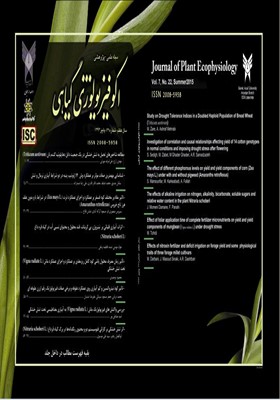The determination and measurement of some secondary metabolites of leaves, stems and roots of Dendrostellera lessertii(Wikstr)Van. Tigeh. and allelopathy effects on barley and mungbean plants
Subject Areas : Journal of Plant Ecophysiology
B. Delnavaz
1
*
,
O. Ataei
2
,
M. Mojdehi
3
![]()
1 - گروه زیست شناسی، واحد ساوه، دانشگاه آزاد اسلامی
2 - گروه زیست شناسی، واحد ساوه، دانشگاه آزاد اسلامی
3 - گروه زیست شناسی، واحد ساوه، دانشگاه آزاد اسلامی
Keywords: “alkaloid”, “phenols”, “hydrolyzed tannins”, “Dense tannins”, “ferro chloride”,
Abstract :
Dendrostellera lessertii )Thymelaeaceae family) is one of the herb and medicinal plants with anti-cancer agents. In this study, active substance of roots, stems and leaves of D. lessertii was determined and assayed. Allelopathic effects of some concentration of alcoholic extract of D. lessertii were evaluated on barley (Hordeum vulgare L.) and mungbean(Vigna radiata L.). The treatments were include organs (leaves, root and stem), concentrations (0, 50 anf 100 mgml-1) and seeds (barley and mungbean). All experiments occurred in laboratories of Saveh University and in completely random blocks design.The present of effective compounds include dense tannins; hydrolyzed tannins and alkaloids identified using TLC analysis and the color reaction with Dragendorff and Ferro chloride reagents. The results showed all organs of D. lessertii are rich of phenols, tannins and alkaloids but in roots and leaves had the highest contents. Phenolic compounds of D. lessertii were very high and hydrolyzed tannins were more than dense tannins. To compare with other plants, alkaloids of D. lessertii organs were the high but phenols and hydrolyzed tannins were low. The results showed D. lessertii alcoholic extract reduce seedlings growth and 66% and 33% seeds germination of barely and mungbean sequentially. Alcoholic extract have allelopathic effects on seeds germination and seedlings growth of barley and mungbean but on barley was more inhibited.

